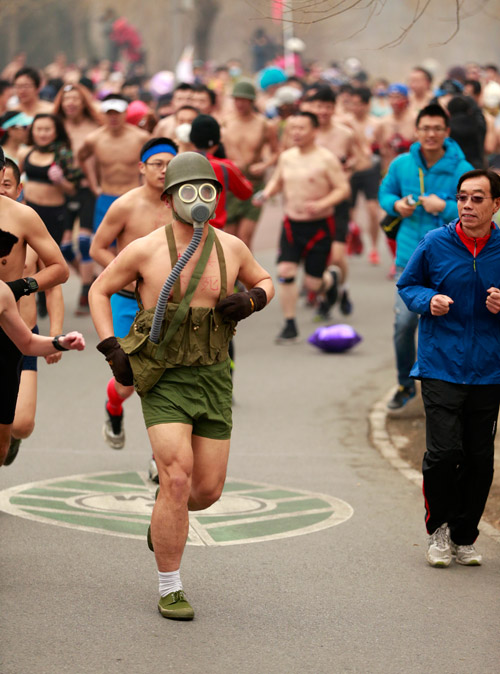People shun outdoors amid smog
 0 Comment(s)
0 Comment(s) Print
Print E-mail China Daily, February 24, 2014
E-mail China Daily, February 24, 2014
As lingering smog blanketed China's northern and central regions for a fourth consecutive day on Sunday, its influence has been felt in people's schedules, as is evidenced by bustling museums, crowded hospital respiratory departments and less cheerful parks.
 |
|
Masks, even a gas mask, are popular among runners attending a "naked run" event at Beijing Olympic Park on Sunday amid heavy smog. The event aims to promote environmental protection awareness.[Photo/China Daily] |
On Sunday morning, the National Meteorological Center issued a yellow alert — the second highest — with smog expected to persist in Beijing and Tianjin, as well as parts of Hebei, Shandong, Henan, Shanxi and Shaanxi provinces. The authority forecast that smog, which shrouded 15 percent of China, will not ease until Thursday when a cold front is expected to bring wind.
Families with children are going less often to parks for weekend outings.
The Summer Palace has seen a 20 percent drop in the number of visitors since Thursday compared with a year ago, according to the park administration. "There might be other factors involved, as the same period last year was still near the Spring Festival holiday. But the smog definitely played a part," said Qi Lin, a staff member at the park administration office.
Zhou Ying, mother of a 3-year-old girl in Beijing's Chaoyang district, said the family canceled its usual weekend outing to Beijing Olympic Park.
"The only option for us is to stay at home, with the air purifier on 24 hours a day," she said.
The Beijing Museum of Natural History was at full capacity on Saturday and sold out all its tickets, according to a worker at the museum's ticket office.
Li Na, the new Australian Open champion, admitted to having to train indoors in Beijing due to the smog.
"Do you think outdoor training is possible under such weather conditions? I can only train indoors, or you can send me two face masks," she said in a group interview on Saturday.
At Beijing Olympic Park, a "naked run" was highlighted by a number of people wearing masks or even gas masks.
The event, dubbed "naked pigs running", as participants were only allowed to wear underwear, drew more than 300 participants.
"If I choose to stay at home every day, I'm going to be bored," said Curtis Sell, a 26-year-old from Britain who studies and works in Beijing.
"Pollution is just one thing. I have my mask. This is safer. But pollution for me is not so important," he said.
Sell said he attended the event to promote environmental awareness.
Meng Guangping, 51, a worker at a Beijing machinery factory, joined the activity for the third time.
"I didn't feel unwell after running," Meng said. "I run regularly and will not stop when there is haze. I think I have become used to the haze."
The number of asthma and emphysema patients seeking help at Beijing hospitals has doubled since the smog started on Thursday, China National Radio reported.
A 52-year-old man, who identified himself as Wang and was seeking medical help at the China-Japan Friendship Hospital, said his respiratory problem acted up soon as he arrived in Beijing on Friday.
Wang said he works in Yangzhou, Jiangsu province, and is in Beijing on a business trip.
"I felt very uncomfortable. The air in my hometown is much better," he said.
Li Yiming, a respiratory doctor at China-Japan Friendship Hospital, said: "Air pollution has adverse effects on the respiratory system. ... I have seen some patients who are well when they are outside Beijing, but start coughing when they return to the city."
Governments are also taking action. Shijiazhuang, capital of Hebei province, enacted an emergency measure on Sunday to cut the number of vehicles by 20 percent based on the last digit of the car license plate.






Go to Forum >>0 Comment(s)